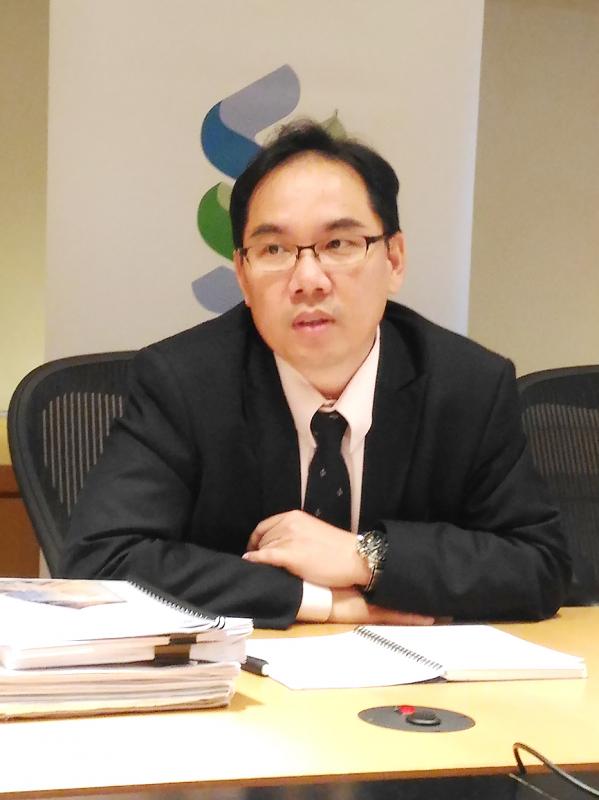Standard Chartered Bank Taiwan Ltd (渣打台灣銀行) yesterday forecast that the economy would grow 3.3 percent next year, following an expansion of 1.8 percent this year.
The projection was conservative compared with the government’s estimate and those predicted by other forecasters, as Standard Chartered is concerned about delayed COVID-19 vaccine distribution and slow private investment, it said.
The nation’s economy is likely to be affected by the slow recovery of the global economy next year, which would affect local tourism and exports of non-technology products, the bank added.

Photo: Lee Ching-hui, Taipei Times
The Directorate-General of Budget, Accounting and Statistics (DGBAS) last month forecast Taiwan’s GDP would rise 3.83 percent next year, while DBS Bank Ltd issued a 4.2 percent expansion forecast.
Meanwhile, most research agencies expect the vaccine distribution to begin worldwide in the second quarter next year and accelerate economic recovery.
However, Standard Chartered is skeptical about quick vaccine deliveries due to production challenges, and allocation and logistics issues, Tony Phoo (符銘財), a Taipei-based economist at the bank, told a news conference in Taipei.
“It remains uncertain how many COVID-19 vaccine doses can be produced next year,” Phoo said. “We assume that 1 billion doses would be produced annually, and it would take at least seven years to reach a high global immunization coverage.”
Assuming that herd immunity would be reached when at least 30 percent of the global population are vaccinated, it would still take a while to see the effect, Phoo said.
“We are facing a demand issue, not supply issues. Only when people feel safe and resume their consumption, the global economy will return to the pre-pandemic level,” he said.
The bank forecast that the nation’s private investment, mostly in the technology sector, would likely slow down next year, Phoo said, citing that imports of semiconductor equipment, a leading indicator of investment in the technology sector, declined 17 percent annually last month.
The prediction came in contrast to the DGBAS’ forecast that private investment would increase by a healthy 3.19 percent next year.
Besides the slowing imports of equipment, the high comparison base would also make it difficult for private investment to stage a strong rally next year, Phoo said.
The bank expects Taiwan’s private consumption to rebound next year, particularly in the second quarter, as the labor market would remain stable, he said.
The central bank would leave the benchmark interest rates unchanged next year, Phoo said, as global economic growth would remain weak and Taiwan’s headline inflation would rise modestly, at less than 1 percent.
The US-China trade tensions would be another potential risk for Taiwan’s economy, Phoo said.
The tensions are not expected to improve or deteriorate anytime soon, he added.

UNCERTAINTY: Innolux activated a stringent supply chain management mechanism, as it did during the COVID-19 pandemic, to ensure optimal inventory levels for customers Flat-panel display makers AUO Corp (友達) and Innolux Corp (群創) yesterday said that about 12 to 20 percent of their display business is at risk of potential US tariffs and that they would relocate production or shipment destinations to mitigate the levies’ effects. US tariffs would have a direct impact of US$200 million on AUO’s revenue, company chairman Paul Peng (彭雙浪) told reporters on the sidelines of the Touch Taiwan trade show in Taipei yesterday. That would make up about 12 percent of the company’s overall revenue. To cope with the tariff uncertainty, AUO plans to allocate its production to manufacturing facilities in

Taiwan will prioritize the development of silicon photonics by taking advantage of its strength in the semiconductor industry to build another shield to protect the local economy, National Development Council (NDC) Minister Paul Liu (劉鏡清) said yesterday. Speaking at a meeting of the legislature’s Economics Committee, Liu said Taiwan already has the artificial intelligence (AI) industry as a shield, after the semiconductor industry, to safeguard the country, and is looking at new unique fields to build more economic shields. While Taiwan will further strengthen its existing shields, over the longer term, the country is determined to focus on such potential segments as

COLLABORATION: Given Taiwan’s key position in global supply chains, the US firm is discussing strategies with local partners and clients to deal with global uncertainties Advanced Micro Devices Inc (AMD) yesterday said it is meeting with local ecosystem partners, including Taiwan Semiconductor Manufacturing Co (TSMC, 台積電), to discuss strategies, including long-term manufacturing, to navigate uncertainties such as US tariffs, as Taiwan occupies an important position in global supply chains. AMD chief executive officer Lisa Su (蘇姿丰) told reporters that Taiwan is an important part of the chip designer’s ecosystem and she is discussing with partners and customers in Taiwan to forge strong collaborations on different areas during this critical period. AMD has just become the first artificial-intelligence (AI) server chip customer of TSMC to utilize its advanced

While China’s leaders use their economic and political might to fight US President Donald Trump’s trade war “to the end,” its army of social media soldiers are embarking on a more humorous campaign online. Trump’s tariff blitz has seen Washington and Beijing impose eye-watering duties on imports from the other, fanning a standoff between the economic superpowers that has sparked global recession fears and sent markets into a tailspin. Trump says his policy is a response to years of being “ripped off” by other countries and aims to bring manufacturing to the US, forcing companies to employ US workers. However, China’s online warriors